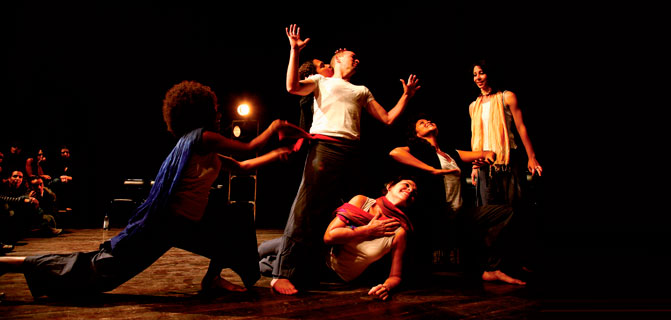
In Cuba, Carlos Borbón, no relation to the reigning king of Spain, gives interviews with the same originality with which he leads his players. On the last Saturday afternoon of each month, Havana's "Spontaneous, or Playback, Theatre" occupies a roof in Old Havana, where the audience not only finds satiric, reflective or tragic performances but also gets involved in bidirectional communication, the roles of emitter and receiver fusing in the heat of the tropical sun.
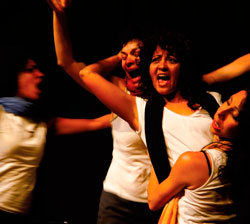 "Lots of people coming to our shows for the first time think we plan the performances ahead. No way!" says Carlos with a look of surprise, the same look that overwhelms those gathered for the participatory creative party at Casa Gaya, the venue of the large crowds coming for this unusual art function.
"Lots of people coming to our shows for the first time think we plan the performances ahead. No way!" says Carlos with a look of surprise, the same look that overwhelms those gathered for the participatory creative party at Casa Gaya, the venue of the large crowds coming for this unusual art function.
The first thing each of the members do when coming onstage is introduce themselves and publicly express their state of mind. That way they create an ambience of trust and sincerity that will later help spectators reproduce the action.
The first invitation to talk is always a little difficult. The first volunteer takes time to appear. Even so, little by little the numbers increase and there comes a time with many raised hands and not so much of an afternoon left.
Once some personal feelings are expressed, three more volunteers are selected, this time to tell a story and place it before the group for them to stage. There is no time to prepare, no procrastination, no getting together to talk it over. It's a simple spontaneous staging.
However, "It is really difficult to think and act simultaneously without seeing a guide" says Carlos. "Onstage, every actor tries to meld with another actor's emotion to make it seem a single entity. There is, at every moment, a character-narrator guiding the action; assuming the role of one telling the story. He or she is the center and the rest of us join his movements and support the action."
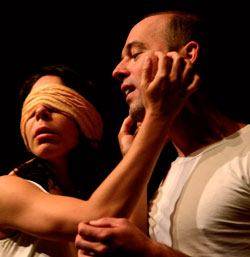 When Carlos first learned of the playback technique, he was working as a nurse, but he soon understood he had found a way of helping people that was more in common with his personality. He was also seduced by the intimate gift of all personal confessions.
When Carlos first learned of the playback technique, he was working as a nurse, but he soon understood he had found a way of helping people that was more in common with his personality. He was also seduced by the intimate gift of all personal confessions.
"Suddenly you find yourself in the challenging position of representing what a person has told you in front of that same person and having to live up to that person's expectations. Although subjectivity can intervene, we are talking about recreating another person's story with that person witnessing it all and able to judge you if you do it wrong".
The group was working together in a workshop from 2001 until 2003, when it changed its name to Teatro Espontáneo de La Habana. There was no casting in choosing the actors. It was quite a natural procedure, said its director, and added that he assumed the position in a spontaneous way too.
"I wanted my friends to know about this experience and I enlisted them. By their own initiative those who did not feel up to the test left the project and my role was the one of sort of leading the way".
The shows of the Playback Theatre ofHavana are quite popular. The word has spread, informally but effectively.
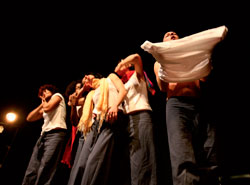 "We have achieved an unexpectedly huge audience. About half of them simply want to watch our performances. When I see our roof-headquarters filled with people I feel immense pleasure. As any other human being, there are some Saturdays when I feel bad and it's difficult, because you don't know how that day is going to turn out. Not all the stories I am faced with are positive. Even so, just the fact of standing before the audience transforms me. I look at people's movements, how they touch elbows, look at each other, cryhellip; that's enough to energize me".
"We have achieved an unexpectedly huge audience. About half of them simply want to watch our performances. When I see our roof-headquarters filled with people I feel immense pleasure. As any other human being, there are some Saturdays when I feel bad and it's difficult, because you don't know how that day is going to turn out. Not all the stories I am faced with are positive. Even so, just the fact of standing before the audience transforms me. I look at people's movements, how they touch elbows, look at each other, cryhellip; that's enough to energize me".
Regarding his ambitions as an actor, Borbón plans to continue helping communication between people."Why would I need more?" By now, for a long time the audience's feedback has given him invaluable statements on his work's importance.
"Once in a show we talked about what can we chose? At the end of the show a woman came up to us and told us about her most recent choice. She had chosen to go out to Teatro Espontáneo for the first time since the death of her son. Those are the things that make us, myself and the rest of the group, feel fulfilled".
The group meeting, Happy the Normal Ones, is named for a poem by Cuban Roberto Fernández Retamar. The last question we ask him is "does this choice reflect a hidden desire to become one of those impeccable beings?"
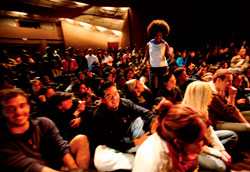 "I not only represent the stories I am told, I am constantly identified by them and I see myself in those beings that have nothing to do with Retamar's poem. No, I wouldn't be able and wouldn't like to be normal".
"I not only represent the stories I am told, I am constantly identified by them and I see myself in those beings that have nothing to do with Retamar's poem. No, I wouldn't be able and wouldn't like to be normal".